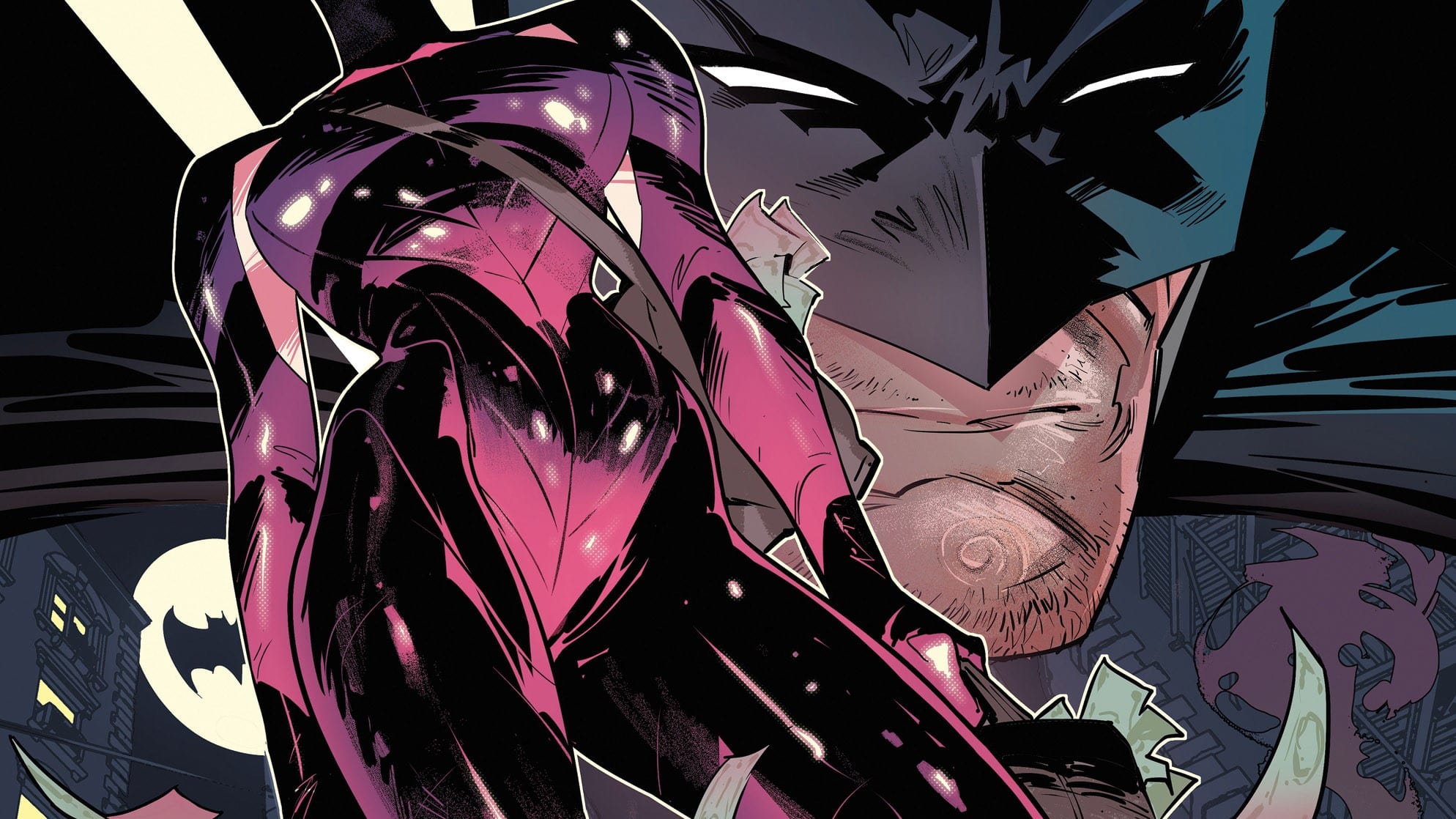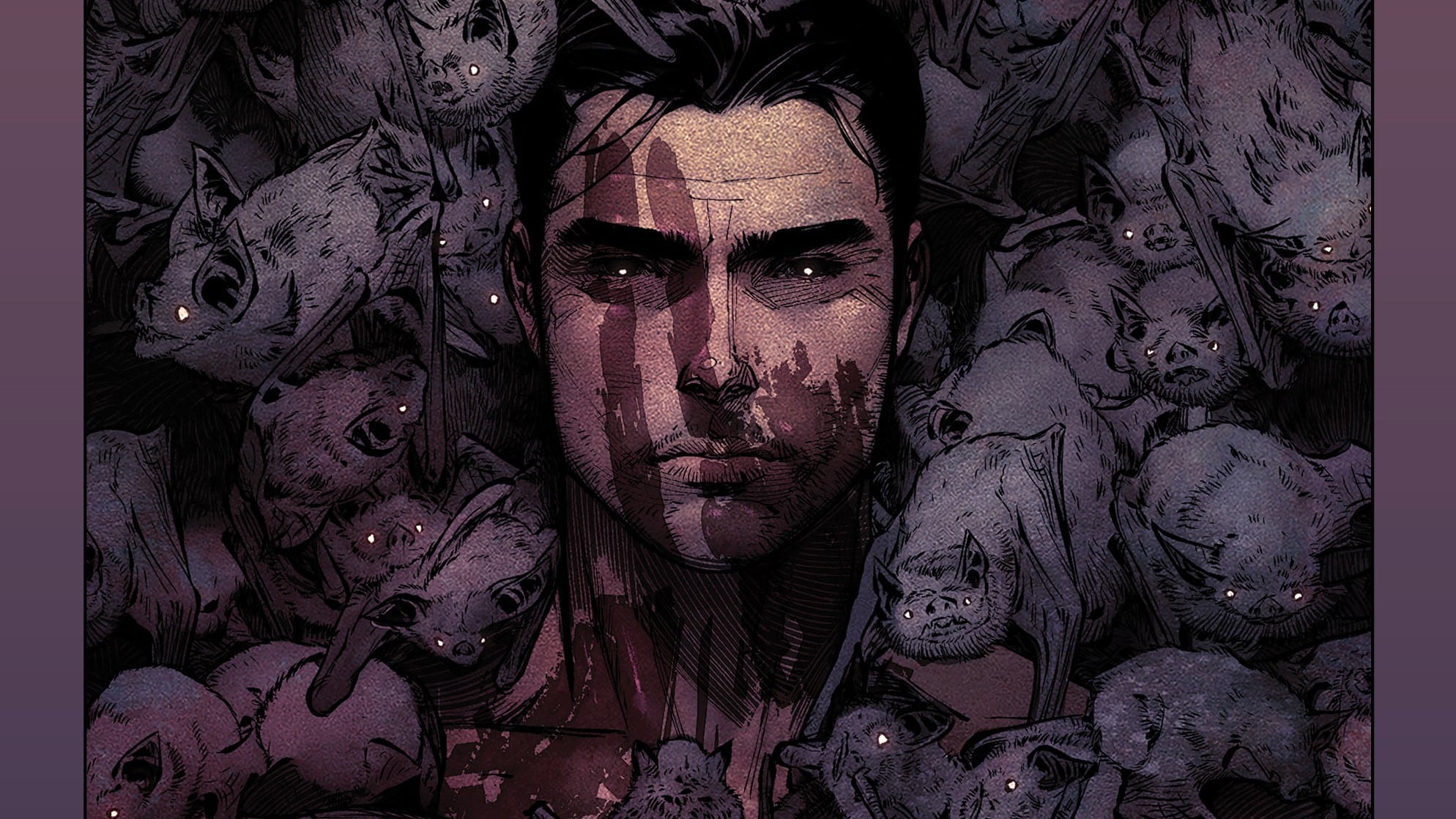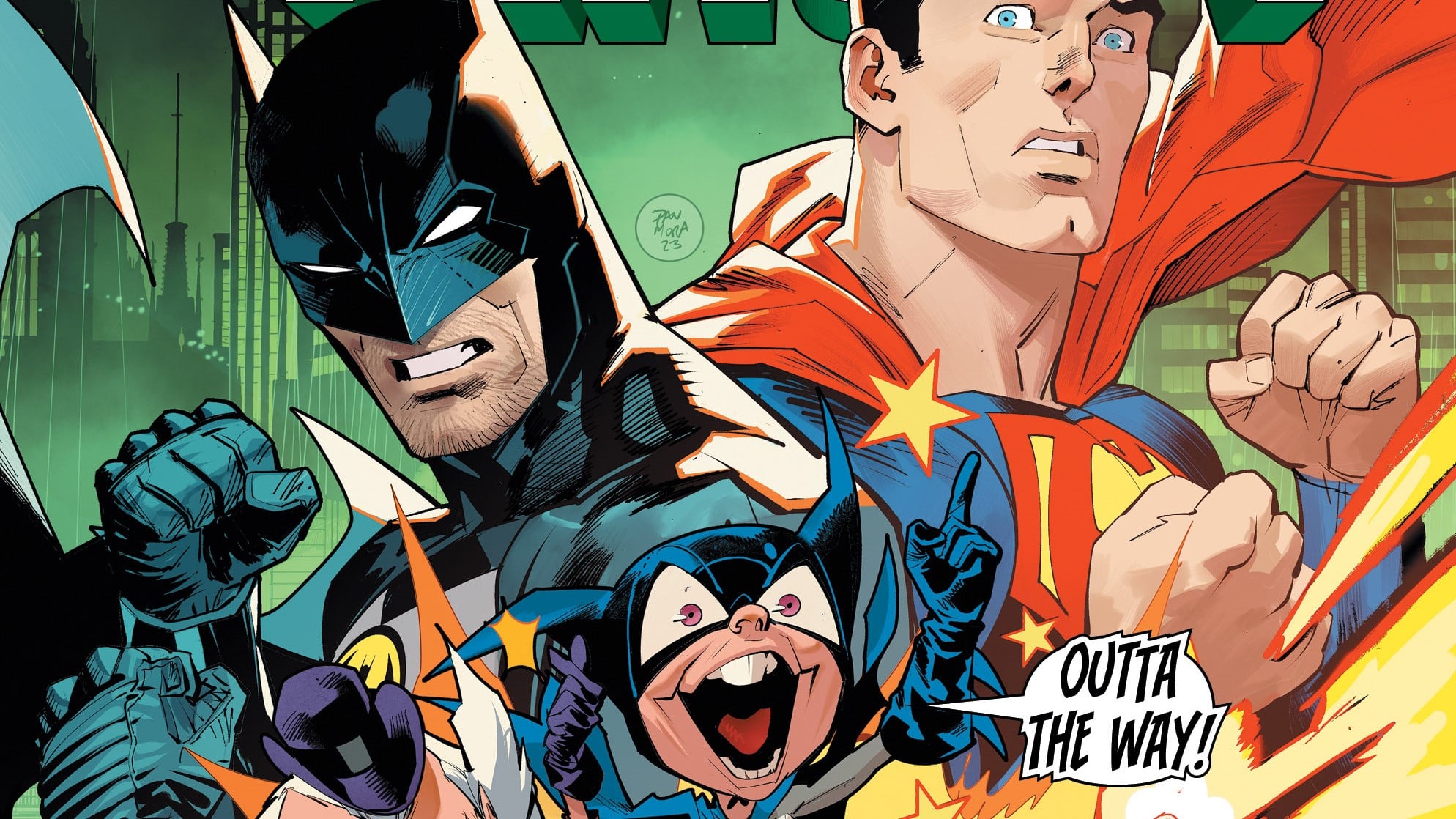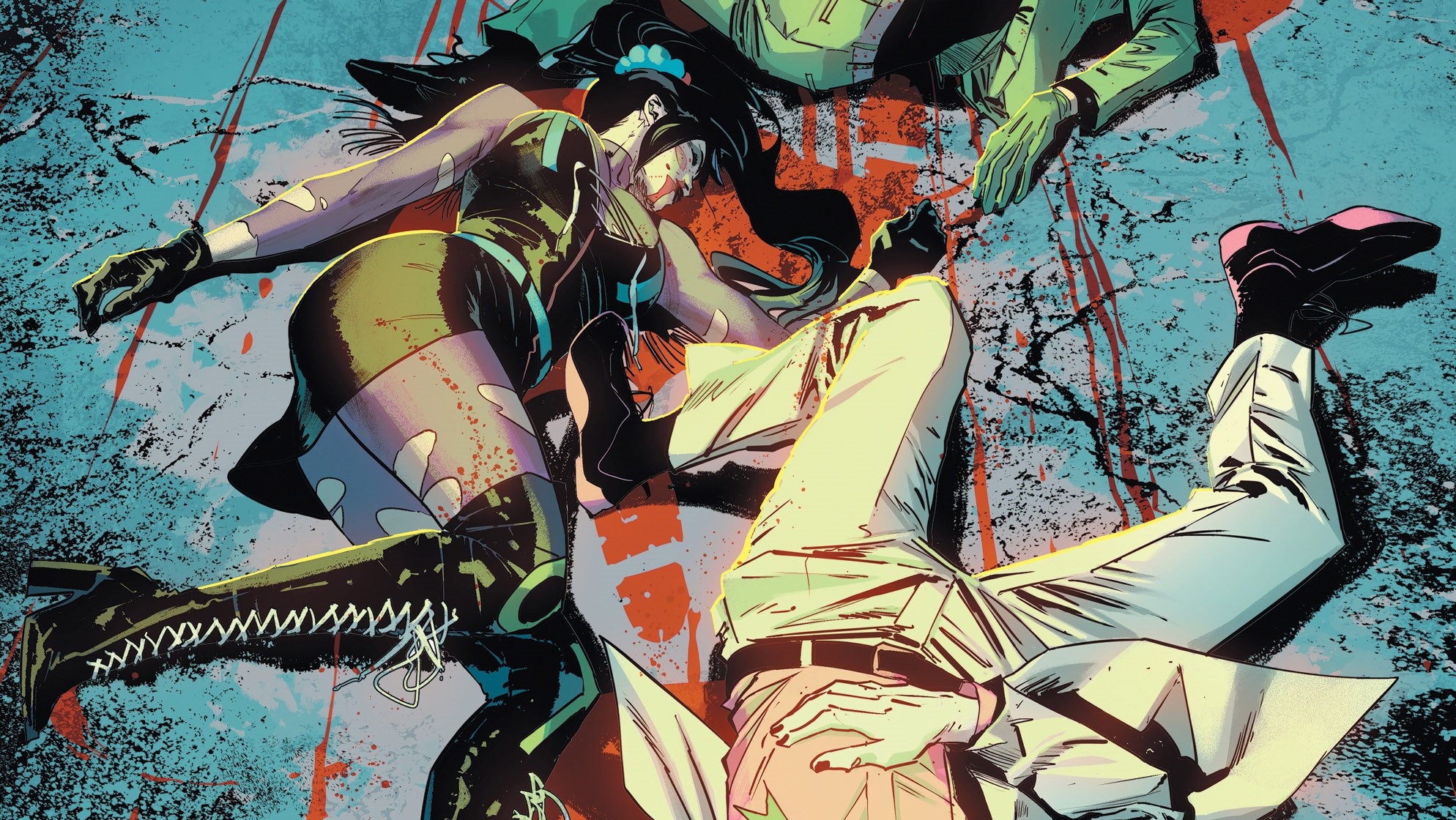After months of exhaustion, Batman collapses and awakens weeks later to find Gotham changed. Crime is down, and the city is quiet. But the reason is not what he would like it to be: Catwoman has organized the city’s small-time crooks and is enforcing rules. As he and the family meet with Selina, lines are drawn and the drumbeat of a different war begins in Batman/Catwoman: The Gotham War: Battle Lines #1, written by Tini Howard and Chip Zdarsky, drawn by Mike Hawthorne, inked by Adriano Di Benedetto and colored by Romulo Fajardo Jr.
The gift of the Pentapriests of the 5th Dimension is killing Jim Gordon, but he isn’t going to go out before stopping the Good People of Gotham. Knight Terrors: Detective Comics #2 is written by Dan Watters, drawn by Riccardo Federici, colored by Brad Anderson and lettered by Steve Wands.
Edward Nashton’s journey reaches its conclusion as he settles some personal scores before setting off on his plan to change Gotham. Riddler: Year One #6 is written by Paul Dano, drawn and colored by Stevan Subic and lettered by Clayton Cowles and Subic.
Matt Lazorwitz: Back from vacation, feeling good and ready to talk about some comics! Two endings and a beginning.
Will Nevin: I was antsy to get into that there beginning you mentioned. And, well, this is what I get for looking forward to something.
A War for Hearts and Minds

Matt: We’ve been seeing the slow build to “Gotham War” since the beginning of both Zdarsky’s Batman and Howard’s Catwoman, and here it is. We’ve seen so many wars for Gotham in recent memory: “City of Bane,” “Joker War,” “Fear State.” But this is a very different take. This isn’t war on the streets. This is an ideological confrontation, akin to Marvel’s Civil War, only here, both sides actually raise valid points.
Will: Are they, though? A big chunk of this feels like a rehashing of the “Why doesn’t Bruce Wayne give all his money to charity?” debate that is ever so tiresome.
Matt: I don’t know. I think this is more arguing the line between policing vs. community outreach. Yes, Selina says something about Bruce spending his money on Bat cars, but she doesn’t talk about him giving his money away. She says she won people over through compassion. If you scratch the surface too deep, there are definitely many arguments to be made that this doesn’t work, especially in a superhero universe, but I think arguments of the closed fist vs. the open hand are more valid than just simple fiscal ones.
Will: I think where this story is starting to turn me off — which is a bad sign seeing as how we’re only in the first chapter — is that, as you said, this is some Civil War analog. And that’s just not something I want. I don’t want to see the Bat family turn against itself. I don’t want to see Batman belittling Nightwing. I don’t want Red Hood as a double agent. It’s just not a story I want to read. I’m supposed to root for all of these folks, Matt. This doesn’t feel like it’s going to be fun, and I don’t think it’s going to be nearly deep enough to make up for that unpleasantness.
Matt: And that is a very fair assessment. There are some stories, good and bad, that aren’t what you want to read. And while I am more interested in this than you are, I’m not jumping up and down with complete excitement either. With it only being eight issues total, I don’t think it will get to talk about the morality of this as much as I want. And more than that, the last panel makes clear what I had been feeling from the earlier pages: The way Bruce is acting is being influenced by Zur-En-Arrh, which means all his actions and judgments are in question. It’s hard to have a moral argument with someone who is dissociating hard.
Will: I don’t even know if Zur-En-Arrh is that much to blame. Sure, Bruce is almost able to talk himself into Selina’s plan, bring rules to crime and only targeting the wealthy and whatnot, but as soon as there’s an unintended consequence, Zur-En-Arrh is right there to assert himself. But there was always going to be something, some perp hitting the wrong target or some innocent dying — that’s the problem with operating outside of the law.
Matt: Absolutely. Listen, the idea that pretty much every second banana in Gotham was willing to work for Selina makes little to no sense. We know for a fact a good number of Joker’s hirelings are in it for the thrill and the violence. And you can’t tell me some of the guys who work for Two-Face or Riddler, guys who are 6’6’’ and 250 lbs. of pure muscle, are going to be talented second-story men; they’re not built for it.
Will: I love any mention of “second-story men” — kudos for that. But your point really gets at something: Is crime in Gotham a sickness that can be cured or a fever doomed to rage forever? Catwoman certainly thinks it can be limited, pruned, quarantined, as it were. But Batman would definitely disagree. And you know something I really didn’t like? Aside from the “My parents were rich!” Selina throwing the wedding in Bruce’s face.
Matt: It really does feel like it’s being framed as him leaving her at the altar because the Bat Signal was in the sky and not her making the choice for him by leaving him. And I don’t like that too, because that’s a symptom of an unhealthy relationship: one person doing things for the other because they feel like it’s best for their partner without consulting with the partner. The actual instance of the wedding has Joker and Holly whispering in Selina’s ear, so I’m willing to give it a pass, but her using that is ugly.
Will: And maybe that’s what we’re supposed to think? But, Jesus, someone should be likable in this story. Maybe Tim. He seems to be doing OK so far.
Matt: I don’t want to spend a lot of time going deep into the motivations of each member of the Bat family as to their decisions, because that could be a couple thousand words on its own, but I do wish more of them had been on Tim’s path, the one that said we needed more data, vs. just jumping on one bandwagon or another. It just feels like a symptom of this story not having enough time. We love a nice, compact story here, but this feels like it could serve from being not an arc but the background for what is happening in Gotham for some time. See the big bads trying to work with a Gotham that Selina is controlling the underworld of. We get hints that Riddler is going to try to team up with Batman, but what if Batman had to work with Selina’s united underworld to stop Bane before the war went from cold to hot? What if Selina starts feeding Oracle information that helps bring down other organizations, earning the trust and respect of the Batgirls? And maybe some things like that happened in the eight weeks Bruce was comatose, but I want to see why everyone is so quickly willing to accept Selina’s idea. Show, don’t tell!
Will: Taking Bats off the board for eight weeks sure is a danged contrivance, isn’t it? So very convenient for him to wake up to a new Gotham. And Montoya’s interaction with him was another thing I didn’t care for. Is it too much to ask for a Batman story in which he is not surrounded by people who dislike and/or hate him?
Matt: OK, I will absolutely say that pisses me off. Montoya was pro-Batman throughout most of her existence. And she herself was a costumed vigilante. When she became commissioner, she was suddenly virulently anti-Batman, and we never got a solid reason. Changing her mind is fine, but without that it just feels like she is that way because the story needs her to be. If you’re going to have this character, why not just introduce Ellen Yindel from Dark Knight Returns into regular continuity, because that is who Montoya sounds like.
Will: Let’s be honest, though: We’re only biding time until Gordon is commissioner again. That’s the natural state of the world. Then again, I didn’t think we’d go this long without Alfred.
Matt: Everything resets to status quo eventually. Bruce will somehow get his hand back soon enough, too. I’m not going to speculate here on how those resets might happen, and I have theories. But for now? We have two months to see how this plays out.
The Fears of Jim Gordon

Matt: Knight Terrors is over, and I think this will go down as one of DC’s more forgettable events. It brought Wesley Dodds, the original Sandman, back from the dead, which is exciting for a very specific strain of fan (me being one of them), and … I don’t think much else. But at least we got a few interesting tie-ins, and Detective was one of them.
Will: Beautiful and weird and oddly emotional — this ’Tec event strain was the class of the bunch. I could spend more time with this creative team and this concept specifically, but the rest of the event I am eager to leave behind.
Matt: The humanity of Jim Gordon helps make these issues stand out. The best tie-ins to this event (and I have yet to read the concluding one-shot, but have read pretty much everything else) were the ones that weren’t just, “Oh, look at the spooky things!” but instead took a deeper dive into who the character is. Flash, Nightwing and Shazam worked the same way; they looked at the insecurities and drives of the characters more than just a simple monster for them to fear.
Will: We’ve gotten some really good Jim Gordon stuff lately, haven’t we? An embarrassment of good Gordon content. And you know, I’ve only read the Knight Terrors books we’ve covered, and I’ve gotta say: I don’t feel like I’ve missed much.
Matt: Unless you really like Deadman or Sandman? You’re good. We usually don’t put spoiler warnings in these columns, because if you’re reading analysis, you enter at your own risk, but since it is a twist, I want to put a big old SPOILER WARNING right here. I had to sit back and think about whether I liked Barbara being the mastermind. But with this being Jim’s fears, and not a shared nightmare (since Babs’ consciousness was sharing a nightmare over in Nightwing), it does absolutely fit. What greater fear does a parent have than not just losing their child, but losing them to their own hubris that they feel they could have prevented?
Will: That’s another lens I didn’t think about — that this was Gordon’s nightmare about Barbara. He’s given so much to Gotham. It would stand to reckon that losing his daughter might be his ultimate fear.
Matt: If you look at the three Good People of Gotham, they could each represent an aspect of Jim’s fear for the city and himself: the wealthy who don’t care or care in the wrong way, excessive violence as an answer to all problems and the loss of his daughter (and Sorrow, his ward at this point). This is a deep inspection of what drives Gordon and what he fears. And damn I love that.
Riddler Rising

Matt: We’ve been saying all along that this book really needs to stick the landing, because this could go very wrong at the end. And goddamn, does it ever stick the landing.
Will: Makes me want to fire up The Batman, that’s for sure. I thought this story was going to be one in which Nashton slowly lost faith in Batman, blaming him for being part of Gotham’s problems. But we end with the parasocial relationship in full bloom. Matt, Wertham is doing somersaults in his grave.
Matt: Yeah, I think this ends right where the movie begins. I definitely want to watch the movie again this weekend, with all this context in mind. I also am really curious to reread this as a whole. I wonder if the unusual structure will feel off reading it in trade; three fairly traditional issues, an issue-long flashback, an issue that is more or less the poetic ramblings of someone who is losing touch with reality, and then back to traditional narrative with some flourishes of Edward’s now much looser relationship with sanity.
Will: Reading this for the podcast will be a treat, especially since some of the details are a little hazy now from the beginning.
Matt: But credit again: This was scheduled as bimonthly, and you know what? It came out bimonthly. No Kevin Smith eight-month-long gaps.
Will: How long have we been waiting on the second half of Widening Gyre?
Matt: We don’t have any interviews that I’ve seen, but from both the quality and the release, it feels like Dano really cared. Maybe the fact that it started six months after the release of The Batman meant Dano waited to be a good way in before handing it over to Subic, or it was all set up to allow for both of them to work on it, but whatever it is? Kudos for getting this out on a schedule.
Will: You’re right — we probably shouldn’t talk about Widening Gyre ever again. But I agree with you that this series was an achievement. Not only did it come out on time, but it was good. We might quibble on its precise measurement of goodness, but would it have been that weird to see this on a list of Eisner nominees? It’s better than that King Riddler shit, for sure.
Matt: No argument. And it didn’t fall into the incel trap of Todd Phillips’ Joker that I was worried it would. Ms. Joon is a victim Edward fixates on, but it never becomes about her loving him, it’s just that she was the person he stumbled across. That would have been such an easy pitfall to hit, but it was deftly avoided.
Will: I hope Dano picks up another comic project at some point. If not, this is not a bad book to stand as your first and only entry into the world of superhero comics.
Bat-miscellany
- There’s no new BatChat podcast this week, but be sure to check out last week’s for three stories where Batman meets the man who killed his parents: Joe Chill.
Disclaimer: As an Amazon Associate, ComicsXF may earn from qualifying purchases.







